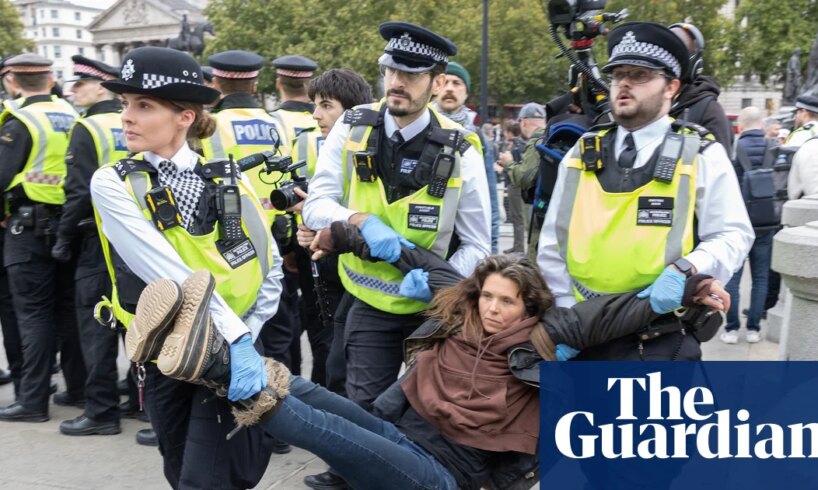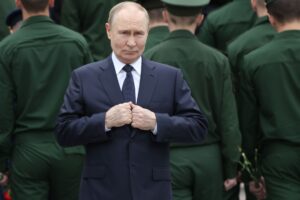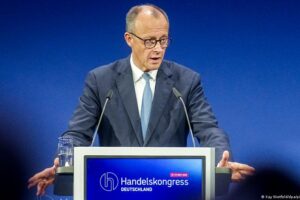
Police have arrested almost 500 people in London at what organisers hoped would be the biggest demonstration so far against a ban on the proscribed organisation Palestine Action.
Officers began arresting demonstrators at the silent vigil in support of the group, which has been classed by the UK government as a terror organisation since July this year.
The first arrest took place shortly after 1pm as the seated protesters took out pens and wrote signs showing support for Palestine Action.
Dozens of police were lined up to begin arresting members of the group, who were sitting silently on the pavement in the square.
Early indications suggest the hundreds of protesters, with a mixture of ages and different backgrounds including many retirees, may not be enough to break the record for the number of arrests.
Two hours into the protest, the organisers said they counted about 1,000 seated people holding signs.
Police start making arrests at Palestine Action ban protest in London – video
The Metropolitan police said: “The final arrest total for today’s public order policing operation in central London is 492.”
The force said 488 arrests were for supporting a proscribed organisation, while the remainder were for being drunk and disorderly, common assault, a public order offence and being wanted for an unrelated matter.
The Met said the youngest person arrested was 18, the oldest 89.
As of Saturday night, 297 were in custody, the rest had been bailed.
The chair of the Metropolitan police federation has claimed “enough is enough” as she said officers policing protests in London were “emotionally and physically exhausted”.
Paula Dodds said: “Enough is enough. Our concentration should be on keeping people safe at a time when the country is on heightened alert from a terrorist attack. And instead officers are being drawn in to facilitate these relentless protests.
Police move a protester. Photograph: Anna Gordon/The Guardian
“And we are coming under attack for doing so. How can this be right?“
She added: “There aren’t enough of us. Hard-working police officers are continually having days off cancelled, working longer shifts and being moved from other areas to facilitate these protests.
“We are emotionally and physically exhausted. What are politicians and senior police officers going to do about it?”
The organisers, Defend Our Juries, previously said they expected the turnout to be higher than previous protests, with more than 1,500 people planning to attend, potentially beating an arrest record set at the 1961 anti-nuclear demonstration, which was held at the same London location.
The demonstration went ahead despite Keir Starmer calling on protesters to call it off to “respect the grief of British Jews”, while Jewish figures called the action “phenomenally tone deaf” after Thursday’s killing of two people in the terror attack on a Manchester synagogue.
In Manchester a demonstration by GM Friends of Palestine to mark the second anniversary of the start of the conflict saw hundreds of people gather.
Manchester for Palestine co-organiser John Nicholson. Photograph: Gary Calton/The Guardian
John Nicholson, a campaigner for the group, said increased tensions since the fatal attack on a synagogue in the city had led to some choosing to stay at home.
“The genocide hasn’t stopped, so why should we?” he said. “If the bombings had stopped for a week, if food and medicine had been allowed to go into Gaza for a week, we may have taken a week off. But they haven’t, so we won’t.”
Nicholson denied the claim that the march was a way of intimidating Manchester’s Jewish population, saying that Jewish people regularly attend the weekly meetings, and that the marches are meant to target policies and governments, not individuals.
“We are not targeting any member of our community, least of all our Jewish community. It is targeted at Trump, at Starmer and at Netanyahu, who are war criminals and who must be held accountable,” he said.
The demonstration ended outside the central library where it joined another group of Palestine activists who were reading the names of all the people killed in the past two years in Gaza. The reading, which was done in order of the ages of the deceased from youngest to oldest, began at 7am and, by the time the march reached it at about 1.45pm, still had not finished the names of toddlers.
A vigil for the children killed in the conflict in Gaza outside Manchester central library. Photograph: Gary Calton/The Guardian
In London, one protester, Trudy Warner, a retired social worker from London, was holding a sign reading “Police find your love, find your conscience.”
She said she was focusing on the police because they were able to take action as individual officers and not participate in the mass arrests.
“I would love to think they could learn from us about the power of collective action and walk away instead of doing this because it’s unconscionable. It’s actually unconscionable.”
A Buckinghamshire couple, Larry and Sue, were holding a sign with a tweaked message in support of “Plasticine Action”.
“About eight policemen came and they read me my rights and said I was being arrested under the Terrorism Act and they were about to take me away so I sat on the floor. And when they were bending down to take me away one of them noticed that it says something else and they had to let me go.”
During the interview with the Guardian, a police officer approached them.
“Sir, can I take your sign please?” the officer said, before realising it did not express support for Palestine Action. “I’m dyslexic!” she added.
“I’m totally fed up with what is happening in Gaza,” said Larry. “Everybody that is not raising their voice to this is somehow slightly complicit in letting our government support this.”
Larry from Buckinghamshire. Photograph: Anna Gordon/The Guardian
The Metropolitan police also said officers arrested six people in connection with a banner draped on Westminster Bridge in support of Palestine Action.
The force said: “Officers were quickly on scene, the banner had been removed and the six people involved have been arrested for supporting a proscribed organisation.”
Responding to Keir Starmer’s suggestion that the action should not go ahead, a Defend Our Juries supporter, Zoe Cohen, who was arrested at the August action and is Jewish, said: “Those who have used the attack on the Jewish community in Manchester to call for today’s vigil to be cancelled are wrongly conflating the actions of the Israeli state with all Jews. Jewish people around the world are not responsible for Israel’s crimes and there are many Jewish people who do not support the actions of the Israeli state. Cancelling today’s vigil would have perpetuated this dangerous narrative which fuels antisemitism.”
She said if there was a strain on policing resources on Saturday, the blame lay with the government. If the protest had been cancelled, it would have been “letting terror win”.
Cohen added: “When I was brought up learning about the Holocaust and we said ‘never again’, I learned that this means ‘never again’ for anyone.”
Meanwhile, hundreds of thousands of Italians and Spaniards marched in Rome, Barcelona and Madrid against Israel’s military campaign in Gaza in a massive show of growing international anger over the two-year war.
The protests on Saturday in Spain were planned weeks ago while those in Italy followed anger over Israel intercepting a humanitarian aid flotilla.





